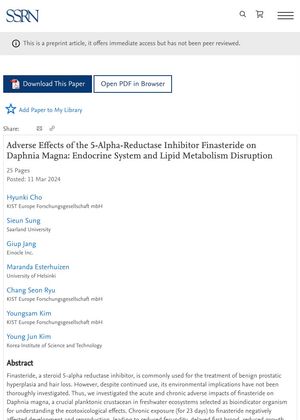Adverse Effects of the 5-Alpha-Reductase Inhibitor Finasteride on Daphnia Magna: Endocrine System and Lipid Metabolism Disruption
January 2024

TLDR Finasteride harms Daphnia magna's reproduction and metabolism.
The study investigates the environmental impact of finasteride, a 5-alpha reductase inhibitor, on Daphnia magna, a key freshwater crustacean. Chronic exposure to finasteride over 23 days resulted in reduced fecundity, delayed first brood, reduced growth, and smaller neonates. Acute exposure (< 24 h) led to decreased expression of genes essential for reproduction and development, such as EcR-A/B, Jhe, and Vtg2, along with oxidative stress-related genes. Lipidomic and metabolomic analyses showed significant alterations in lipid categories and metabolic pathways, including the pentose phosphate pathway and amino acid metabolism. The findings highlight the complex molecular and metabolic disruptions caused by finasteride, stressing the need to understand the environmental effects of pharmaceuticals to protect aquatic biodiversity.




